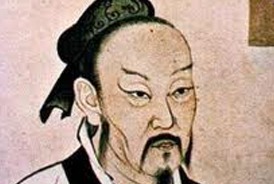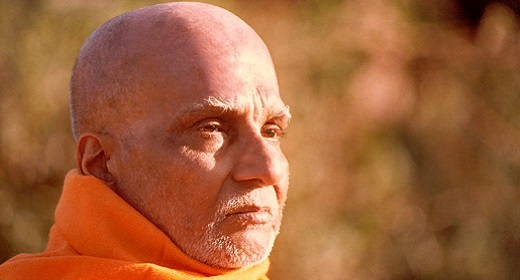Like Lao-tzu, Chuang-tzu is named as both the author of Taoist texts appearing in the late Warring States period of ancient China (4th century B.C.E.)
 and as the generic title for a set of Taoist texts added to and revised over the next several centuries. In either case, Chuang-tzu is a “brilliant figure,” notes commentator Vervoorn, “who aside from Confucius is the single most important figure in the history of Chinese eremitism.” Vervoorn elaborates:
and as the generic title for a set of Taoist texts added to and revised over the next several centuries. In either case, Chuang-tzu is a “brilliant figure,” notes commentator Vervoorn, “who aside from Confucius is the single most important figure in the history of Chinese eremitism.” Vervoorn elaborates:
For Confucius, Mencius and the wandering scholars influenced by them, refusing or retiring from office was always a second choice, a course of action which was forced on one by circumstances. Even those who reacted against what they regarded as the moral obtuseness of the wandering scholars … shared their basic premise that selfless devotion to the Way is the first duty of a worthy man, and that if circumstances allow it he must serve his ruler in whatever way is appropriate.
But for Zhuangzi it was not a question of being pushed into an eremitic life by adverse circumstance: for him, eremitism properly understood, was the highest ideal to which a man can aspire.
The relationship of Chuang-tzu to Lao-tzu is a perfect complement. Where the Lao-tzu is seen as a political document addressing the ideal ruler, the Chuang-tzu is a practical approach for the lay person. Where Lao-tzu is considered philosophical and mystical, Chuang-tzu is eminently plain and direct. Where Lao-tzu requires intuitive transference of virtues from ruler and sage to individual, Chuang-tzu starts and effectively ends with individualistic prescriptions. As Vervoorn puts it,
From the perspective of eremitism Zhuangzi’s teaching may be summarized as follows: Stay our of sight and out of trouble; keep away from politics and state affairs until such times as you have achieved sagehood. The perfect man (the sage, the true man), however, is beyond harm and can wander where he will, freely and joyfully; his environment has no effect on him, so he is totally at ease whether in or out of the world’s affairs.
The authentic writings of the historical Chuang-tzu are called the “inner chapters” and comprise the first seven of 33 chapters. Translator Burton Watson also includes chapters 17-19 and chapter 26 as representative in style and thought of the authentic Chuang-tzu. These chapters are “characterized by a wealth of lively and witty anecdotes,” notes Watson.
Chapters 8-11 are constructed on passages of Lao-tzu and closely parallel the anti-cultural thought of Lao-tzu. These are considered authentic Taoist philosophy. One of the clues to the authenticity of the chapters is that the authentic chapters are separately titled, while other chapters take their titles from the first sentence of the text.
The less authentic chapters are the “outer” chapters and the “miscellaneous” chapters. Chapters 28-31 are altogether dubious additions of a late date and, as Watson notes, “have long been eyed with suspicion.” Chapter 32 presents Chuang-tzu’s last days, while the concluding chapter 33 is a good overview of Taoist thought added when the rest of the chapters were fixed.
The inner chapters are the focus here, although there are many important passages throughout the complete works that will be offered as aphorisms. A table of contents then follows.
The Ideal Person
An important point to note in the history of Chinese eremitic texts of this period is the development of the ideal person. For Confucius, the Moral Hero was the composite of gentleman-scholar and recluse, but even at this early stage, Confucianism had observed desirable virtues in other social archetypes, such as the Wise Rustic (a farmer, fisher, or gatekeeper), or what Berkowitz calls the Ill-fated Wretch, the gentleman-scholar born at the wrong time and bemoaning his fate.
Additionally, the history of Chinese eremitism had already presented the figure of Po-i as an ethical ideal, sometimes called the Ethical Martyr. Over time, the Hundred Schools of the Spring and Autumn period and especially the later Warring States period, had developed these ideals into what Chuang-tzu calls the Paragon of Extraordinary Conduct.
These prototypes include not merely the ethical and court recluses but also those who remain in court such as the Arch-Egoist. In society, the archetypes become more numerous: the Inconspicuous, the Histrionic Madman — also seen in Confucius — the Anti-Sage such as the famous Robber Chieh, who also appears in Confucius, the aspirants to longevity and immortality called Champions of Unbridled Immaculacy, and the Idealist seen in the school of Tillers and Farmers. Chuang-tzu briefly describes each of these through anecdotes and conversations.
Commentator and translator A. C. Graham identifies Chuang-tzu himself as the Untroubled Idler, described in one of the miscellaneous chapters as:
Heading for the woods and moors, settling into the spacious wilderness, angling for fish in deserted places. This is simply doing nothing. It is the taste of the gentlemen of rivers and seas, those who shun the age, the untroubled idlers (15).
Thus the Untroubled Idler eschews conventional society and social relations but does so without a compelling ethical reason. This fits Chuang-tzu exactly, taking into account nevertheless his brilliance as a philosopher and writer.
Ultimately, Chuang-tzu wants to merge all the disparate personalities of the Paragon of Extraordinary Conduct into what is variously called the Perfect Man , the True Man, the Great Man, or the Sage.
In chapter 1, Chuang-tzu identifies the basic flaw of the old scholar-gentleman model and the minimum of necessary virtue to present his paragon. He identifies the flaw as pride:
A man who has wisdom to fill one office effectively, good conduct enough to impress one community, virtue enough to please one ruler, talent enough to be called to serve one state.
These are Confucian virtues, but time and disposition prove them to undermine personal ethics and to nurture pride and moral complicity. Chuang-tzu quotes a recent contemporary’s reaction to these qualities.
Sung Jung-tzu would certainly burst out laughing at such a man. The whole world could praise Sung Jung-tzu and it would not make him exert himself; the whole world could condemn him and it would not make him mope. He drew a clear line between the internal and the external, and recognized the boundaries of true glory and disgrace. But that was all. As far as the world went, he did not fret and worry, but there was still ground he left unturned.
The historical Sung Jung-tzu taught a version of Mo-ism in his thorough rejection of social convention. But the criticism strikes at the heart of what the Confucian scholar-gentleman craved. Chuang-tzu follows this passage with the story of Hsu Yu, to whom the emperor wished to cede his throne. Hsu Yu replies with a lengthy refusal, concluding: “I have no use for the rulership of the world.”
Chuang-tzu’s own aphorism sums up the paragon: “The Perfect Man has no self; the Holy Man has no merit; the Sage has no fame.” Thus, three essential virtues comprise a single one, and refute the paradoxical ambitions of the old scholar-gentleman.
Chuang-tzu uses simple analogies with natural objects to illustrate his paragon. In illustrating personal behavior, he refers to a big, gnarled tree that is of no value to the woodcutter. “You have this big tree and you are distressed because it is useless. Why don’t you plant it in Not-Even-Anything Village, or in the field of Wide and Boundless, then relax and do nothing by its side, or lie down for a free and easy sleep under it? If there is no use for it, how can it come to grief or pain?”
Other natural objects express the “unbridled idleness” of Chuang-tzu’s philosophy. “The swamp pheasant has to walk ten paces for one peck and a hundred paces for on drink, but it does not want to be kept in a cage.” Fish thrive in rives and lakes, forgetting each other. Water at rest is the perfect model of being, nothing outside of it and nothing within disturbed. The natural world governs itself without human intervention or instruction. “Virtue is the establishment of perfect harmony. Though virtue takes no form, things cannot break away from it.” In breaking away and attempting his own ambitions, human beings contrive their own miseries.
This last conclusion highlights chapter 5, where several people with physical disabilities present themselves as paragons by understanding human limitations beyond the physical: the man who lost a foot, the ugly Ai Tai-to, the hunchback. Conventional thinking concludes that they are punished by Heaven. But they remind us of the gnarled tree. “If virtue is preeminent, the body will be forgotten.” The lessons of this chapter are not intended to be poignant. Chuang-tzu puts his own words into the mouth of Confucius:
Life, death, preservation, loss, failure, success, poverty, riches, worthiness, unworthiness, slander, fame, hunger, thirst, cold, heat — these are the alternations of the world, the workings of fate. Day and night they change places before us and wisdom cannot spy out their source. Therefore they should not be enough to destroy your harmony; they should not be allowed to enter the storehouse of spirit.
Elsewhere in the chapter, Chuang-tzu speaks of the sage and the sage’s wanderings. For the sage, knowledge has no value because the sage hatches no schemes. The sage does not make worldly commitments and thus needs no devices to reconcile contradictions. He does not solicit favors and thus suffers no losses. The sage is not peddling teachings to the world, thus requires no skills. Between society and self, the difference is practical:
If the sage already got food from heaven, what use does he have for others? The sage has the form of a man but not the feelings of a man. Since he has the form of a man, he bands together with other men. Since he does not have feelings of a man, right and wrong cannot get at him. Puny and small, he sticks with the rest of men. Massive and great, he perfects his Heaven alone.
An interlocutor objects to the idea that a person can have no feelings. Chuang-tzu explains what he means by not having feelings:
I mean that one does not allow likes and dislikes to get in and do one harm. The sage just lets things be the way they are and does not try to help life along.
The practical implications of Chuang-tzu’s philosophy are best seen in the realm of power and authority, in the “world of men,” which is the title of the relevant section. Here Chuang-tzu’s philosophy is put into the mouth of Confucius when his favorite disciple Yen Hui wants to go to straighten out the conduct of a certain prince. Confucius warns him:
You will probably go and get yourself killed, that’s all. The Way does not like things mixed in with it. Where there is a mixture, the Way becomes many ways, and many ways means a lot of things going on and a lot of things going on means trouble, and trouble has no remedy. The Perfect Man of ancient times made sure that he had the Way in himself before he tried to give it to others. Whey you are not even sure of what you have in yourself, how do you have time to bother about what some tyrant is doing?
This conversation continues, with Yen Hui insisting and Confucius patiently explaining the consequences of getting involved with the world. When the former finally asks for the proper way, Confucius advises him to fast — not from food in a ritual way but a fasting of the mind. Advises Confucius:
Make your will one. Do not listen with your ears but with your mind; no, not you r mind but with your spirit. Listening stops with the ears, the mind stops with recognition, but spirit is empty and waits on all things. The Way gathers in emptiness alone. Emptiness is the fasting of the mind.
Of course, the historical Confucius did not pursue this train of philosophizing, though as mentioned, all of ancient Chinese philosophy recognized a Way and only differed in means to attaining it. In successive presentations of this chapter, Chuang-tzu’s scintillating insights provide a practical path for those in the world, adapting Lao-tzu here and in subsequent inner chapters.
Chapter 17 offers the famous anecdote of Chuang-tzu lounging on the river bank when court officials come to persuade him to enter court service. Chuang-tzu refers to the dead sacred tortoise kept in the king’s storage box, brought out on ceremonial occasions, contrasted with the tortoise on the riverbank alive and dragging its tail in the mud. He asks the officials whether the tortoise (on the bank — either himself or one he points out — would rather be dead and honored or alive and dragging its tail in the mud. The officials answer that the preference would be the latter. With that, Chuang-tzu tells them to go away.
The Untroubled Idler upholds the notion of wu-wei or non-action. This is not a fatalism or indifference, but a positive value that rescues virtue rather than compromises it. For all that, Chuang-tzu does not insist on absolute withdrawal from the world. Better to be invisible, inconspicuous, with virtue intact, than to be tempted by pride or heroic virtue to live alone in mountain or forest. Eremitism accomplished in the world can be a more congenial path for the average person aspiring to a paragon than absolute reclusion with its attendant temptations to virtue.
Conclusion
Chuang-tzu represents the logical evolution of eremitic thought in Ancient China, at once a composite of other schools and a distillation of what was eminently practical and realistic. Chuang-tzu inspires with its humane insight and its balance of lofty purpose and earthbound homeliness. Chuang-tzu testifies to the complex and rich history of reflection on reclusion and the solitary life that ancient China bequeathed to the world.
Aphorisms
The entire writings ascribed to Chuang-tzu are filled with valuable aphorisms. Here are a few without pursuing the fairly clear philosophy they present.
- To act through inaction is called Heaven. To speak though inaction is called Virtue.
- When the world has the Way, the sage joins in the chorus with other things. When the world is without the Way, the sage nurses virtue and retires in leisure (11).
- One’s starts and stops, life and death, ups and downs — none of these can one do anything about. Yet one thinks their mastery lies with human beings. Forget things, forget Heaven, and be called a forgetter of self (12).
- Do not go into hiding, do not come out and shine — stand stock still in the middle (12).
- Limpidity, silence, emptiness, inaction: these are of Heaven and earth, the substance of the Way and its Virtue (13).
- The Great Man in his actions will not harm others, but he makes no show of benevolence or charity. … The Man of the Way wins no fame, The highest value wins no gain. The Great Man has no self (17).
- The Sage has buried himself among the people, hidden himself among the fields. His reputation fades away but his determination knows no end. Though his mouth speaks, his mind has never spoken. Perhaps he finds himself at odds with the age and in his heart disdains to go along with it (25).
- [Remark of a sage in refusing service:] I have no desire to become an official, I have fifty mou of farmland outside the walls, which is enough to provide me with porridge and gruel, and I have ten mou of farmland inside the outer wall, which is enough to keep me in silk and hemp. Playing my lute gives me enjoyment enough, studying the Way of the Masters gives me happiness enough. I have no desire to become an official (28).
- [On Po-i and Shuh-chih, famous recluses who died rather than serve:] Men such as [these] will have nothing to do with wealth and eminence if they can possibly avoid it. To be lofty in principle and meticulous in conduct, delighting in one’s will alone without stopping to serve the world — such was the ideal of these two gentlemen (28).
- The petty man will die for riches, the gentleman will die for reputation. … Do not be a petty man — return to and obey the Heaven within you. Do not be a gentleman — follow the reason of Heaven. Crooked or straight, pursue to the limit the Heaven within you. Turn you face to the four directions, ebb and flow with the seasons. Right or wrong, hold fast to the round center upon which all turns, in solitude bring your will to completion, ramble in the company of the Way (29).







































